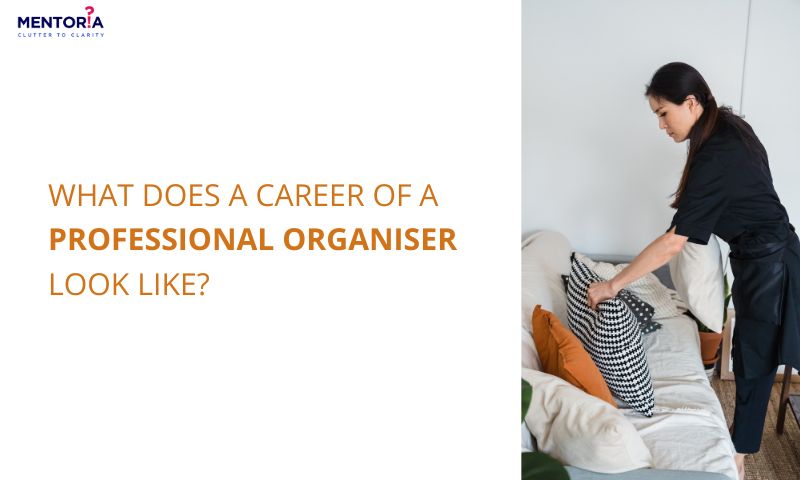What Does A Career of a Professional Organiser Look Like?

Have you ever looked around your space and felt overwhelmed by the clutter? Or perhaps you’ve experienced the liberating feeling that comes after organising a chaotic room? If you find joy in creating order out of chaos, a career as a Professional Organiser might just be your calling. Let’s dive into what this unconventional career path entails and why it’s gaining all the traction.
Who is a Professional Organiser?
A professional organiser helps individuals and businesses declutter and optimise their spaces. This role goes beyond merely tidying up; it involves developing personalised systems that enhance efficiency and improve overall quality of life. Professional organisers work with clients to understand their unique needs and preferences, crafting solutions that are sustainable and tailored to their lifestyles.
The Growing Demand for Professional Organisers
In today’s fast-paced world, many people struggle to maintain organised spaces. With the rise of remote work and the increasing value placed on mental well-being, the demand for professional organisers has surged. According to the National Association of Productivity and Organising Professionals (NAPO), professional organising is one of the fastest-growing industries, with more people seeking help to manage their homes, offices, and lives.
Skills Required to Become a Professional Organiser
Becoming a professional organiser requires a mix of practical skills and personal attributes. Here are some key skills essential for this career:
- Organisation and Planning: The core of this profession is the ability to organise and plan efficiently.
- Problem-Solving: Each client presents unique challenges, requiring creative and effective solutions.
- Communication: Excellent verbal and written communication skills are necessary to understand client needs and explain organising systems.
- Empathy and Patience: Working closely with clients means being empathetic to their struggles and patience as they adapt to new systems.
- Attention to Detail: A keen eye for detail ensures nothing is overlooked during the organisation process.
- Time Management: Efficiently managing your time and your client’s is crucial for success.
What Does A Professional Organiser Do?
While the specific duties of professional organisers can differ based on the client, here’s a brief overview of their key responsibilities:
Assessing Client Needs
Usually start by conducting a thorough initial consultation to understand the client’s specific needs, challenges, and goals and then develop customised plans based on the individual client’s needs and circumstances.
Decluttering and Sorting
They assist clients in deciding what to discard, donate, or sell. This step involves a thoughtful process of letting go of unnecessary items, which can be a significant part of creating a more organised space and then helping them sort items into logical categories to make them more accessible and manageable.
Implementing Organisational Systems
They sort items into logical categories to make them more accessible and manageable. Guide in optimising layouts to maximise space and improve flow within a room.
Providing Tools and Resources
Suggest suitable storage bins, shelves, and other organisational aids to help clients maintain their newly organised spaces. Educate clients on maintaining organisation by teaching them techniques and best practices.
Maintenance and Follow-Up
Offer follow-up sessions to ensure the effectiveness of the organisational systems and provide ongoing help and periodic reorganisation services to assist clients in maintaining their spaces.
Specialised Services
Digital Organisation: Organising digital files and assets to help clients manage their electronic information efficiently.
Time Management: Creating schedules and productivity systems to help clients manage their time effectively.
Event Planning: Organising events for smooth execution, handling all the details to create a seamless experience.
Pathway to Become A Professional Organiser
Education and Certification
While formal education isn’t mandatory, courses in organising principles can be beneficial. Certifications from organisations like NAPO can enhance credibility. One can also earn a CPO Certification. The Association of Professional Declutterers and Organisers (APDO) offers certification for professional organisers. To earn the Certified Professional Organiser (CPO) credential, you generally need at least five years of experience and 1,500 hours of organising work with clients. The certification exam consists of 125 multiple-choice questions. You can take the exam in February, June, or October at testing centres in London or Newcastle. Achieving CPO certification validates your expertise and experience, significantly boosting your job prospects in the field.
Gain Experience
Start by organising events or spaces for friends and family to build your portfolio. This hands-on experience helps you develop your skills and gather testimonials, which can be crucial for attracting future clients.By offering your services for free or at a reduced rate, you can gain practical experience, develop your organisational skills, and gather testimonials.
Develop a Niche
Specialising in a specific area of organisation can help differentiate you in the market.nSpecialising in areas like home organisation, office organisation, or digital organisation can set you apart. Focusing on a niche allows you to become an expert in that field, making you more attractive to clients looking for specific solutions. For example, home organisation may involve decluttering and creating storage solutions, while office organisation could focus on improving workflow and productivity. Digital organisation might include managing electronic files and optimising digital tools.
Build a Portfolio
A strong portfolio is essential for showcasing your skills to potential clients. Document your work with before-and-after photos, client testimonials, and case studies. Highlight the challenges you faced and the solutions you implemented. A well-organised and visually appealing portfolio can be a powerful tool to demonstrate your expertise and effectiveness as a professional organiser. Consider creating both a physical portfolio for in-person meetings and a digital version for your website and social media profiles.
Marketing and Networking
Effective marketing and networking are crucial for growing your client base. Utilise social media platforms like Instagram, Facebook, and LinkedIn to showcase your work, share organisational tips, and engage with your audience. Attend industry conferences and workshops to stay updated on the latest trends and connect with other professionals. Joining professional associations like the National Association of Productivity and Organising Professionals (NAPO) or the Association of Professional Declutterers and Organisers (APDO) can provide valuable networking opportunities and access to resources that can help you grow your business.
How Mentoria Can Help
Mentoria offers personalised career guidance and coaching to individuals who wish to explore a career as a professional organiser. Our experienced mentors provide valuable insights, advice, and support tailored to your unique aspirations and goals. Whether you’re considering becoming a professional organiser, transitioning from another career, or starting your own organising business, Mentoria can help you navigate the challenges and opportunities ahead. With the right support and guidance, you can confidently pursue a career as a professional organiser and achieve your professional goals. Embrace the opportunities that lie ahead and embark on a rewarding and fulfilling career journey as a professional organiser with Mentoria by your side.









